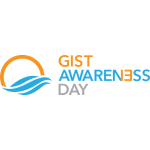GIST Awareness Day Date in the current year: July 13, 2026
 GIST Awareness Day, observed annually on July 13, was created to raise awareness of gastrointestinal stromal tumors (GISTs), a type of soft-tissue sarcoma that arises in the gastrointestinal tract.
GIST Awareness Day, observed annually on July 13, was created to raise awareness of gastrointestinal stromal tumors (GISTs), a type of soft-tissue sarcoma that arises in the gastrointestinal tract.GISTs affect the mesenchyme, which is loosely organized embryonic connective tissue composed of undifferentiated mesodermal cells that can develop into various tissues. These tumors arise from a specific type of cell called the interstitial cells of Cajal. Most GISTs are caused by mutations in the KIT gene, though other genes, such as PDGFRA or BRAF, can also be involved.
GISTs typically originate in the stomach but can also develop in other parts of the gastrointestinal tract, including the esophagus, small intestine, colon, and rectum. Approximately 70% of GISTs occur in the stomach, followed by the small intestine at 20%.
GIST is the most common type of sarcoma but still a rare cancer, as sarcomas account for only about 1% of adult cancer diagnoses. GIST occurs in 10 to 20 out of every million people per year, though some speculate that its true incidence might be higher due to underdiagnosis. GIST most often affects older adults, with roughly equal numbers of men and women affected across most of the age spectrum. However, pediatric GISTs are more prevalent in females.
GIST symptoms are nonspecific and vary depending on the tumor’s size and location. These symptoms include vague abdominal pain or discomfort, early satiety, nausea, vomiting, weakness and fatigue due to anemia, difficulty swallowing, gastrointestinal bleeding (blood in stool or vomit), and unexplained weight loss.
Due to the nonspecificity of the symptoms, GIST often takes a long time to diagnose. It is often discovered during routine tests such as endoscopy, diagnostic laparoscopy, ultrasound, CT scan, or MRI scan. A biopsy is required to confirm the diagnosis.
Localized GISTs are usually removed surgically; small tumors can even be removed with laparoscopy. The decision whether or not to operate depends on the tumor’s size, whether it has metastasized to other organs or tissues (such as the liver or peritoneum), and the patient’s overall health. In some cases, neoadjuvant therapy may be prescribed to shrink the tumor before removal. Small tumors do not require further treatment once removed and rarely return. However, if the tumor has metastasized, surgery is usually followed by oral chemotherapy.
GIST Awareness Day was created by the Lift Raft Group (LRG), a nonprofit organization that provides support to patients with GIST. In 2013, the LRG launched the Rare 13 campaign to raise awareness that approximately 13 people in the United States are diagnosed with GIST daily. The campaign was successful, so in 2014, the LRG organized the first GIST Awareness Day. Since then, it has been held annually on July 13.
GIST Awareness Day aims to raise public awareness of GIST, ensure that patients have access to necessary support and resources, and advocate for continued GIST research to improve diagnosis, treatment and patient outcomes.
- Category
- International Observances
- Tags
- GIST Awareness Day, international observances, awareness days, cancer awareness days, gastrointestinal stromal tumor